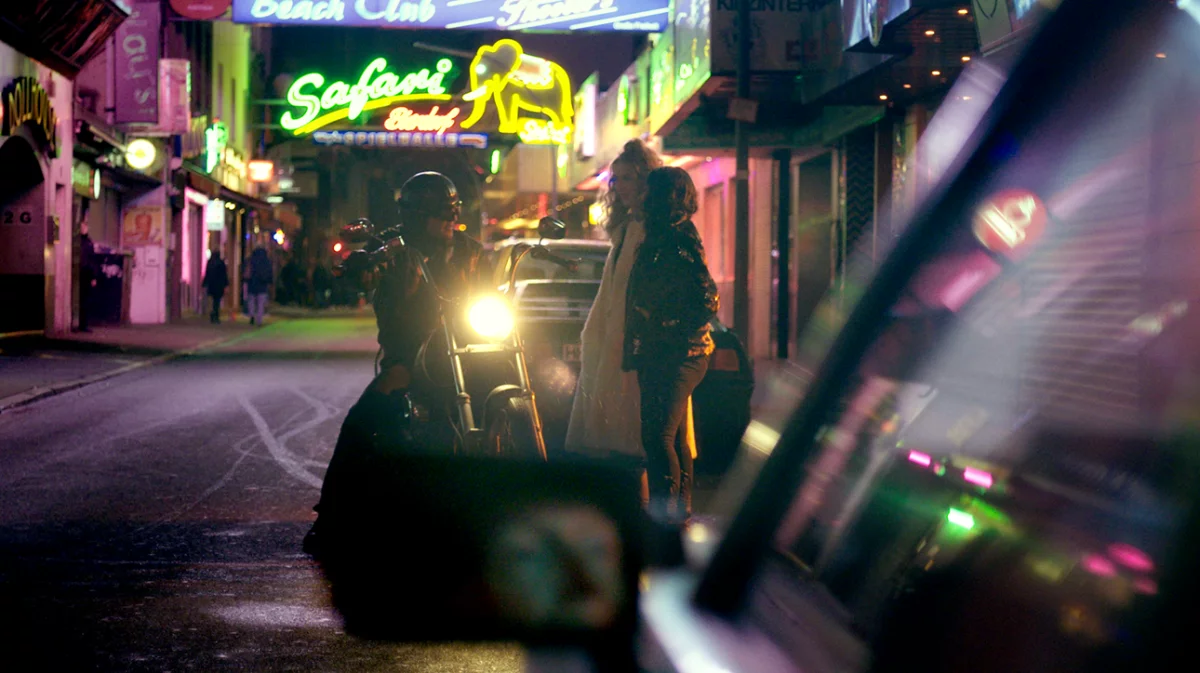The hardest 80s in Hamburg
03.02.2022 | Reeperbahn series at Filmfest Hamburg

The fact that the Reeperbahn of the 80s is not comparable to today's party district is probably not unknown to many. However, the high-end documentary series "REEPERBAHN - SPECIAL UNIT 65" by gebrueder beetz filmproduktion, which tells the fight from a police perspective and can now be seen at Filmfest Hamburg, impressively shows just how brutal the fights between rival gangs and louts really were at that time.
Handsome Klaus, the Nutella gang, Werner "Mucki" Pinzner - the list of illustrious names is long. In the 1980s, organised crime flourished on Hamburg's most sinful mile. Between prostitution and drug dealing, various gangs and pimps made a name for themselves: "Many things are simply unimaginable from today's perspective. The brutality between the gangs, the toxic relationship between men and women, who in the 70s and 80s needed permission from their husbands for everything and had virtually nothing to say. It was very frightening to see this in such clarity," says Christian Beetz, who produced the documentary series with his Berlin-based company gebrueder beetz and also co-wrote the script.

Beetz himself lived in the Hanseatic city until the end of the 1990s and therefore knows the neighbourhood first-hand. With "REEPERBAHN - SPECIAL UNIT 65", he wants to reopen a dark chapter in Hamburg's history and consciously change his perspective: "All the stories that have been told about the neighbourhood in the 70s and 80s so far have been written from the point of view of the male hoodlums and gangs. The fates of the women play a subordinate role. We think this is absolutely out of date and want to break new ground with our series and show the events from a police perspective - from the point of view of Special Directorate 65," reveals Beetz. The special commission was founded in Hamburg in the 1980s to combat organised crime - it later evolved into the State Criminal Police Office (LKA), which is active throughout Germany.

Work on the police series began in early 2020: a large team led by Hamburg-based Script Writer Ina Kessebohm and Segment Producer Anne von Petersdorff threw themselves into research for months, rummaging through mountains of archive material and conducting countless background interviews before the actual filming could begin in the summer. Most of the interviews were conducted in and around the neighbourhood. Former police officers and investigators have their say, as well as neighbourhood celebrities, including "Zur Ritze" owner Carsten Marek and Kalle Schwensen.

Directors Georg Tschurtschenthaler and his creative team combine previously unpublished archive material with interview sequences and fictional elements in their series. "Our motto is clearly 'archive comes before fiction'. In other words, slightly fictionalised elements are only used where we didn't have any material but absolutely needed it. This clearly sets us apart from the docu-drama genre," says Executive Producer and Script Writer Christian Beetz. The film also focuses on the events of the time and upheavals in society as a whole: Franz Josef Strauß makes incendiary speeches in Hamburg as a candidate for chancellor against the incumbent chancellor Helmut Schmidt, the founding of the GREENS, the punk movement, the emerging AIDS pandemic. "That sets us apart from many true crime series that are shown on Netflix, for example. We place the events in a large, socio-political context," says Beetz.

If you read anything about "REEPERBAHN - SPECIAL UNIT 65" in the press these days, you can't avoid the term "high-end series". But what exactly does this mean for viewers at home? For one thing, a great deal of research went into it. "It wasn't always easy to get our protagonists in front of the camera and convince them of our cause. Some of them were speaking for the first and probably last time. Co-writer Ina Kessebohm, Segment Producer Florian Fettweis and Show Runner/Director Georg Tschurtschenthaler had many preliminary discussions and had to be very sensitive in their approach," says Producer Beetz. says Executive Producer Beetz. Another high-end aspect: the elaborate look. Hamburg-based Director of Photography Matthias Bolliger was brought on board at a very early stage as a versatile DoP who had already proven his craft in gritty environments in the series "4 Blocks" and the film "Nur Gott kann mich richten". "He has a strong visual language and is very good at realising visual concepts," says Beetz. Each interview is staged in carefully selected atmospheric locations.

The five-part series, which is being co-produced with Studio Hamburg Enterprise, will then appear in the ARD media library in autumn: "After our Netflix series 'Rohwedder', we have decided to produce the next high-end documentary series with ARD in Hamburg. ARD's media library, which is becoming increasingly popular, is the perfect platform to reach a younger audience," says Beetz. And if the series really takes off in the media centre, a second season would of course also be conceivable. The Reeperbahn has more than enough stories to tell.





